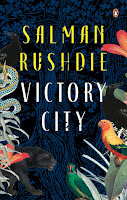Londonstani
Set in a part of
Londonstani showcases a fusion culture where kids grow up in
The narrator is a boy named Jas and it is a tale of him trying hard to belong. He makes sure he talks in the right lingo and does the right things, just so that he can be part of the ‘rudeboys’. The group he desperately wants an in into consists of Hardjit (right name Harjit), a Sikh boy, the leader and body perfect, Amit whose brother Arun’s marriage is becoming a soap opera and Ravi, innocuous and tactless. His plans of integration into this world soon come apart – with his obsession for Samira, a Muslim and therefore a complete no-no for his group, his advice to Arun to rebel against his mother that makes for unfortunate consequences and the group’s growing involvement in a mobile phone scam.
Jas’s story is pretty engrossing at the beginning. But after a while, the lingo no longer surprises and the situations drag. The ending of course, is completely farcical. Londonstani is, like I mentioned earlier, a decent read. Nothing more, nothing less.




1 comment:
You're right, close portrayal of the stories I have heard from some British Indians. Typical ABCD if you replace the 'A' with a 'B' for British.
Post a Comment